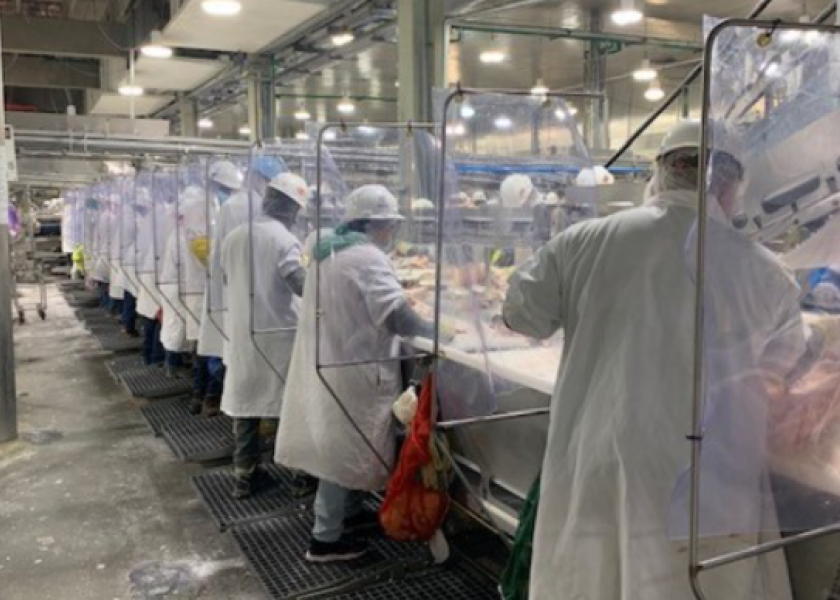Meatpackers Pushed "Baseless" Claims To Influence White House, Report Alleges

America’s large meatpackers pushed “baseless claims of beef and pork shortages in the early weeks of the pandemic to persuade the Trump administration to keep packing plants running and disregard the risks of the coronavirus,” according to a special House subcommittee investigating the nation’s pandemic response. At least 269 meat packing workers eventually died from the virus.
On Thursday, the House select subcommittee released a report alleging that Tyson Food’s legal team prepared a draft with input from other packers that became the basis for Trump’s executive order to keep the plants running in April 2020.
“Meatpacking companies knew the risk posed by the coronavirus to their workers and knew it wasn’t a risk that the country needed them to take,” according to the report by the select subcommittee on the coronavirus crisis. “They nonetheless lobbied aggressively — successfully enlisting [the U.S. Agriculture Department] as a close collaborator in their efforts — to keep workers on the job in unsafe conditions, to ensure state and local health authorities were powerless to mandate otherwise, and to be protected against legal liability for the harms that would result.”
The report from the bipartisan House select subcommittee is based on review of 151,000 pages of documents, more than a dozen survey calls with meatpacking workers union representatives, former Agriculture Department and Occupational Safety and Health Administration officials, and state and local health authorities. The subcommittee also held a staff briefing with OSHA and USDA.
The report alleges the nation’s largest meatpackers and industry trade groups repeatedly misled the public when they warned that a slowdown in their operations posed an imminent threat to the nation’s meat supplies. But “these fears were baseless,” investigators wrote.
Responding to the allegations, the North American Meat Institute, the nation’s trade association for meat and poultry packers and processors, called the subcommittee’s report “partisan” and that it “distorts the truth about the meat and poultry industry’s work to protect employees” during the COVID-19 pandemic.
“The report ignores the rigorous and comprehensive measures companies enacted to protect employees and support their critical infrastructure workers,” said Julie Anna Potts, president and CEO of the Meat Institute. She said the Meat Institute and member companies voluntarily provide hundreds of thousands of pages to the committee.
“The meat and poultry industry, like many industries, was challenged by the pandemic in the spring of 2020. As more became known about the spread of the virus, the meat industry spent billions of dollars to reverse the pandemic’s trajectory, protecting meat and poultry workers while keeping food on Americans’ tables and our farm economy working.”
Yet the committee’s report suggests such internal industry documents showed that “despite awareness of the high risks of coronavirus spread in their plants, meatpacking companies engaged in a concerted effort with Trump Administration political officials to insulate themselves from coronavirus-related oversight, to force workers to continue working in dangerous conditions, and to shield themselves from legal liability for any resulting worker illness or death.”
Gary Mickelson, Tyson’s director of public relations, told The Washington Post that the company has worked with government officials at many levels in both the Trump and Biden administrations as it navigated the pandemic.
“This collaboration is crucial to ensuring the essential work of the U.S. food supply chain and our continued efforts to keep team members safe,” Mickelson said in a statement to The Post. “For example, last year Tyson Foods was supported by the Biden Administration as we became one of the first fully vaccinated workforces in the U.S. Our efforts have also included working cooperatively and frequently with local health department officials in our plant communities.”
Jim Monroe, Smithfield’s vice president of corporate affairs, told The Post his company has invested more than $900 million to support worker safety, including paying workers to stay home, and have exceeded Centers for Disease Control and Prevention and OSHA guidelines.
“The meat production system is a modern wonder, but it is not one that can be re-directed at the flip of a switch,” Monroe said in a statement. “That is the challenge we faced as restaurants closed, consumption patterns changed and hogs backed-up on farms with nowhere to go. The concerns we expressed were very real and we are thankful that a true food crisis was averted and that we are starting to return to normal.”
Unmoved by such meat packer arguments, House Appropriations Committee Chair Rosa DeLauro (D-CT) called the House subcommittee report “damning.”
“Not only does it highlight the meatpacking industry’s baseless claims that jeopardized the health and livelihoods of hundreds of workers, it demonstrates their willingness to price gouge American consumers in the name of ‘inflation’. Meatpackers warned us in April 2020 that the closure of plants to protect workers’ health would threaten the domestic food supply chain, but that same month U.S. pork exports were at an all-time high.”
DeLauro said meatpackers “need to answer for this deception, be held accountable for endangering workers, and must immediately lower food costs for working families. We need an economy that works for all, not just the wealthy and richest corporations. We need to put people over profits – period.”
However, the Meat Institute claims the “House Select Committee has done the nation a disservice.”
Potts said the committee could have tried to learn “what the industry did to stop the spread of COVID among meat and poultry workers, reducing positive cases associated with the industry while cases were surging across the country. Instead, the Committee uses 20/20 hindsight and cherry picks data to support a narrative that is completely unrepresentative of the early days of an unprecedented national emergency.”







